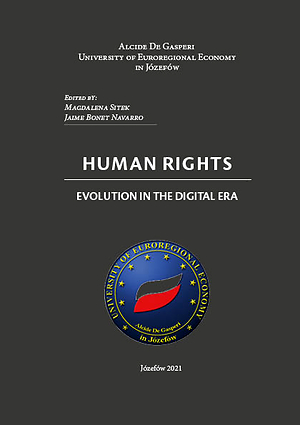Wydawnictwo
AWSGE
AWSGE

Akademia Nauk Stosowanych
WSGE
im. Alcide De Gasperi
WSGE
im. Alcide De Gasperi
BOOK

HUMAN RIGHTS - Evolution in the digital era
Publication date
2021-12-18
ISBN
978-83-954584-4-6
Place
Józefów
Format
210x148
Binding
Pages count
368
Editors
Magdalena Sitek, Jaime Bonet Navarro
Publisher
WSGE
CHAPTERS
MAN IN THE VIRTUAL WORLD
La forza universalistica dei diritti e il primato della dignità della persona
Michele Indellicato
11-18
Cybermedicina, invenzioni biotecnologiche e diritti umani: le frontiere
dell’umanesimo giuridico nel nuovo millennio
Ferdinando Parente
19-27
Unmanned aerial systems (uas or drones) and data protection: some reflections on recreational drones and their privacy impact
Jose Zamora Manzano
28-52
El derecho al olvido, su regulación a nivel Europeo y Español
Fernando Santana Medina
53-67
MODERN TECHNOLOGY AT WORK AND EVERYDAY LIFE
69-76
The civil service in terms of the Human Resource Management
Strategy in the Civil Service until 2020
Agnieszka Łukaszczuk
77-93
The role of local government in environmental protection
Marcin Mamiński
94-107
108-127
Concern for a safe civilization
Stanisław Stadniczeńko
128-144
145-158
„Digital natives” – opportunities and threats resulting from the use of
modern media in the education process
Wioleta Wieczorek-Płochocka
159-173
SELECTED SOCIAL ISSUES
Modern Mobile Devices and the Safety of Road Traffic Participants
Teresa Gądek-Hawlena, Katarzyna Nowak
175-194
The idea of the precautionary procedure – a case study
Izabela Juhnke
195-209
210-229
The right to life and health and the effectiveness of social
campaigns to improve road safety in Poland
Maria Michałowska, Teresa Gądek-Hawlena
230-250
Execution of a court bailiff in the virtual world
Paweł Piotrowski
251-265
266-282
283-304
305-334
335-354
Artificial Intelligence – Choice of Case Law
Witold Wyporek
355-368
ABSTRACT
This publication contains studies conducted by authors from several European
countries that have cooperated with each other for many years in the field of
human rights. The fruit of this cooperation are numerous conferences and
publications in various languages. What is most important, however, is the
exchange of experiences and opinions on understanding and application of
individual human rights from the perspective of the experiences of societies
living in the European cultural circle, and at the same time functioning in
different historical and geographical conditions.
This publication is an attempt to look at human rights from the perspective
of the dynamic progress that is connected with the development of ICT tools.
It is not only about digitization or automation of human work, but above
all about creating a virtual society, in which artificial intelligence plays an
important role. A significant part of human activity, especially interpersonal
communication, takes place with the use of social media. Moreover, individual
contact with public authorities are being gradually replaced by intelligent
computer programs. In the United States, there is already an IT system, which
adjudicates in minor misdemeanor cases.
Modern researches in IT sector aim to build programs that allow to support
human thinking through recommendation algorithms or suggesting automatically
learned solutions, and even aim at autonomous decision-making. This last
level of shifting responsibility for decisions to artificial intelligence is assessed
extremely positive by many people, but also brings many fears. A virtual society
built with the use of artificial intelligence changes the perception of many
human rights, such as the right to good name, the right to freely express one’s
opinion, the right to property, the right to state or national identity.
Hence this publication contains various opinions on the artificial intelligence
and its role in the functioning of society and importance for the life of
an individual. The added value of this publication is the fact that it contains
balanced views and assessments of authors from various European countries
and academic societies conducting research on digital reality.
This publication will certainly allow the reader to form his or her own
opinion on human rights in the context of artificial intelligence.
We process personal data collected when visiting the website. The function of obtaining information about users and their behavior is carried out by voluntarily entered information in forms and saving cookies in end devices. Data, including cookies, are used to provide services, improve the user experience and to analyze the traffic in accordance with the Privacy policy. Data are also collected and processed by Google Analytics tool (more).
You can change cookies settings in your browser. Restricted use of cookies in the browser configuration may affect some functionalities of the website.
You can change cookies settings in your browser. Restricted use of cookies in the browser configuration may affect some functionalities of the website.





